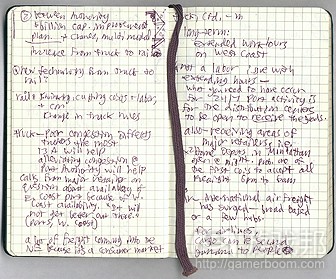分析角色扮演游戏玩家类型及其乐趣所在
作者:Chris Lepine
在方格纸上绘制地牢的地图,沉迷于《Infocom》以及《Ultima》中的小道具或者“可感觉艺术品”,小心翼翼地阅读着格子中的每一份说明书以及印刷资料,并写下任务笔记。不论什么时候当我的女朋友看到我在做这些事情时总会嘲笑我,就像当我10岁在玩游戏的时候,我的父母的反应一样:只有傻子才会想这么做。但是正是接触了这些事物,我才能够更近地接触游戏,并亲近于游戏。对于我来说,它们不只是艺术品,而是整个世界。
最近,Michael在Brainy Gamer发表了一篇关于如何管理棒球类游戏中的记分牌的优秀(然而却很容易被误解)文章。听起来有点无聊吧?肯定了,除非你真正理解他笔下的那些数字,并真正带入游戏中进行思考。在这篇文章中,我将秉承公平的态度,讨论玩家是如何被游戏所“吸引”,从而更好地解释Michael所说的“吸引”。在你阅读这篇文章之前,有必要先了解Michael的文章,因为我将会在文章描述中提及相关内容。相信我,这是一篇有价值的文章。
让我们先处理棒球游戏中的记分机制:
“给棒球运动记录分数将能够让你犹如身临比赛现场的感受。”
如果能在棒球游戏中设置记分卡,是否将能够让玩家更加亲近于游戏体验,而不只是从一个看台观众的角度去看待游戏?
我认为,创造这种亲近感有两种方法:
1)使用记分卡机制。Michael这么描写他的体验:“一位惯用右手的击球手遇到了一个惯用右手的投球手。这两个人之前已经屡次遇到,所以我将这个投球手的名字标记在击球手的名字旁边。旗帜,即在游戏一开始便用来记录风势的标志,现在变得疲软无力了。我同样也将其记录了下来。”按照Michael的说法,使用这种记分卡需要耐心,注意力,技巧,判断力以及较好的记忆。而这些技巧性行为仅次于人类的另一种个人行为…
2)通过想象力去操纵投球手,击球手,外野手,内野手等角色。而作为吸引玩家的主要内容,这些角色都很重要。包括我们也要思考玩家在“球场”中的感受和想法。Michael还补充道:“如果击球手较有耐心,那么他的命中率将会很高,但是如果他总是很焦虑,就像我的记分卡所记录的他之前的表现,他的命中率将会很低,并且很容易被淘汰。不论是击球者还是投球者都知道这一点。所以我也知道。”
现在,让我们分析记分员的记分行为。记分员并不只是在记录分数,同时他也必须按照统计原理去分析这些数据,并得出相应结果。而这时游戏对于他而言将不只是种想象,有可能是真正存在于面前的事物。他也不再是一个被动的旁观者—–他将会更加投入于游戏中,好似自己的任何判断对于投球手的选择来说都很重要。
记分员需要做些什么?我想所有人应该都熟悉玩家在角色扮演游戏中应该做些什么吧?必须在游戏规则以及虚构的幻想中逐渐融入游戏世界中。记分员就像是一件艺术品或者音乐作品的鉴赏者,他们会在关注于艺术品本身的同时也留意其中的一些细微差别。相比之下,休闲的旁观者只会活在游戏幻想中,而严格的数据统计者除了复杂的微积分,甚至看不到游戏的存在,所以,只有记分员会真正地去玩游戏。他们会全身心地投入与游戏中,按照自己的节奏进行游戏。
按照这种区别,我们意识到有3种不同类型的电子游戏玩家:
“会计员”
游戏与衍生规则还有一定距离。玩家玩游戏的时候必须理解这些规则,创造所谓的差别,并根据自己所理解的去追求自己感兴趣的内容:游戏中的人造产品,财富,任务成就以及角色属性等。
这类型的玩家很难与游戏规则进行直接的交流,规则对于他们来说是一种不可接触,不可侵犯的外在内容;而他们只能尽可能地尝试去掌握游戏。
“吞噬者”
游戏的乐趣就是会将玩家带进一个科幻的世界;他们无所谓游戏中数量和质量,单纯依靠自己在游戏早期的个人价值而判断游戏类型,并按照自己的想法将游戏进行归类。如果发现游戏规则并不适合自己,他们就会感到不安,忽视它们甚至是做出一些违规行为(如作弊)。这种类型游戏的结果常常不是很重要,只要第一人称角色扮演游戏也能够满足玩家的需要,对于他们来说这类型的游戏便与探险类游戏一样有趣。
“扮演者”
玩家能够很深刻地理解游戏。游戏世界就像是一个有生命,有呼吸,且自给自足的世界,与玩家想象中的完全相反。而扮演者可以通过自己对游戏规则的理解去寻找在游戏中的欲望。也就是,玩家们的欲望会在游戏最后,根据他们对于规则的理解而有所变化。他们会带着一种责任感,关注度以及在游戏中所发现的个人价值去感受这个游戏世界(游戏邦注:经常是借助于玩家所扮演的角色)。这种玩家才是真正在游戏中游戏。
当然了,我们会发现这些玩家类型都被理想化了,其实每一位玩家都同时出现在游戏世界中,而正是因为他们存在了不同,才能帮助我们更好地去思考每一个玩家真正需要的是什么。
结语
欣赏一件事物不只是发个人情感或者简单地分析它的构成要素这么简单。欣赏游戏,艺术,音乐,棒球,甚至是我们家小猫的叫声等都需要我们带着自己的情感真正投入于其中,了解规则,背景,甚至是我们自己。电子游戏和电脑游戏的现象论(即描写我们在不同情境下的个人体验)是我们必须学习的一种新语言。而理解并欣赏游戏能够让我们更深入地融入游戏,而不只是作为自己一时兴起的兴趣。我真的很感谢Michael把我们带入了这个话题的讨论中。
游戏邦注:原文发表于2008年6月29日,所涉事件和数据均以当时为准。(本文为游戏邦/gamerboom.com编译,拒绝任何不保留版权的转载,如需转载请联系:游戏邦)
The Joy of Role-Playing
By Chris Lepine
Sketching out dungeon maps on graph paper, marveling at the trinkets or “feelies” in Infocom and Ultima games, vigilantly reading every manual and printed material in the box, and writing pages of quest notes. Whenever my girlfriend sees me meticulously doing any of these kinds of things I get the same befuddled smirk my parents gave me when I played games as a 10-year-old: only another nerd could truly appreciate this. Yet, these are exactly the kinds of things that draw me closer to games and give me a sense of intimacy that allows me to appreciate them not just as works of art, but as worlds.
Recently, Michael of the Brainy Gamer wrote a brilliant (yet terribly misunderstood) exploration of the phenomenology of keeping a scorecard at a baseball game. Sounds a little boring eh? You bet… until you understand the level of intimacy that he creates just by writing down a few numbers and thinking through the game. In this post I’ll try to do justice to just what Michael might have meant by the word “engagement” by talking a little bit about what people do when they “engage” themselves with a game. Before you read this, it’s critical to read Michael’s post first… because I’ll be referring to it throughout. Trust me, it’s worth it.
Let’s deal with scorekeeping a baseball game first:
“Scoring a ballgame brings you closer to the game being played on the field”
How is it possible that keeping a score card at a baseball game could actually create a level of intimacy with the game that goes beyond spectating? Isn’t it just a cold calculus of the mind?
From what I can tell, this intimacy is produced in two ways:
1) Through the mechanics of maintaining the scorekeeping card. Michael writes of his experience: “A right-handed batter steps to the plate to face a right-handed pitcher. These two have faced each other many times, so I note that this pitcher “owns” this batter with a mark next to the batter’s name. The flags, which indicated that the wind was blowing out at the start of the game, have now gone limp, so I note that on my scorecard as well.” From what we gather from his story, keeping the score card requires patience, attentiveness, technical skill, judgment, and a darned good memory. This skillful act, while important (as we’ll find out), is secondary to another personal act…
2) Through the imaginative work of playing the roles of the pitcher, batter, fielders, basemen, etc. This act, as form of engagement with the game, is primary. It involves how we imagine the on-field players are feeling and thinking. As Michael says in a later comment, “If the batter can be patient, he will likely see a good pitch to hit, but if he’s over-anxious, as my scorecard tells me he was both previous times, he’s probably going to be vulnerable to a pitch low and away. He knows this. The pitcher knows this. And so do I.”
Now let’s think about what happens when someone scorekeeps the way he does. The scorekeeper does not just record numbers, statistically analyze them, and spit back out the results. He also does not just imagine the game as a personal fantasy; the game is going on in front of him. He is also not a passive spectator – he feels invested in the game as if his judgments were just as important as the pitcher’s choices.
What the scorekeeper does, and I daresay all people familiar with role-play do, is engage themselves with the game at a level beyond both rule-following and imaginary fantasy. The scorekeeper is like an appreciator of fine art or music: they are mindful of the subtleties and nuances of the ‘rules’ while simultaneously mindful of the art work itself. Where the casual spectator can only engage with the game in fantasy, and the rigid statistician does not “see” a game but a complex calculus, the scorekeeper plays the game. They are engaged with the baseball game at a bodily and spiritual level – the game unfolds for them at their personal pace.
Based on those distinctions we can imagine that there are three (idealized) kinds of video game players:
“The Accountant”
The game is enjoyed at a distance as sets or levels of generative rules. The game is played in terms of understanding these rules and making distinctions, and using this understanding to obtain something of personal interest: in-game artifacts, treasure, quest completion, character attributes, etc.
Because the player has no personal engagement with the rules, the rules are seen as inviolable, impersonal, and external; the player often attempts to master or dominate the game.
“The Devourer”
The game is enjoyed as a flight into fantasy; it is “consumed” by the player because s/he makes no distinctions of quality or quantity within the game. This kind of player simply relies upon their inchoate sense of personal value which determines their play style, and the game is subsumed by their desires. If the game rules do not suit them, they are tossed, ignored, or violated (ie. cheating). The kind of game does not matter much in the end; an FPS could be just as enjoyable as an adventure game as long as it satiates their desires.
“The Role-Player”
The game is understood as deeply personal yet otherworldly. The game world exists as a living, breathing, self-sufficient world, separate from the player’s desires. Yet, the role-player finds ways of discovering his/her desires within the game, by understanding the game’s rules. The player’s desires, in the end, are reshaped by their understanding of the rules. They engage with the game world (usually through a Player-Character or avatar) with a sense of commitment, care, and personal value for what happens in the game. This player plays in the game.
Of course we can see that these player types are idealized, and every player sits in all camps simultaneously, but drawing out the distinctions brings us closer to understanding just what’s at stake for the average player.
Loving Games is Hard Work
Appreciating anything is more than just distilling our personal enjoyment from it, and more than just coldly analyzing its constituent elements one at a time. Appreciating games, art, music, baseball, the subtleties of my cat’s meows, all require a deep personal engagement only possible when we allow ourselves to become mindful of the rules, what’s happening in front of us, and our selves. Developing a phenomenology (a description of our personal engagement with some phenomenon) of video and computer games is one of the new languages that we have to develop, among other things. Understanding and appreciating games allows us to engage with them in deeper waters and ensures that they won’t become just another flavor of the month. I’m deeply thankful that Michael started paddling us down this creek in the first place.(source:artfulgamer)










































